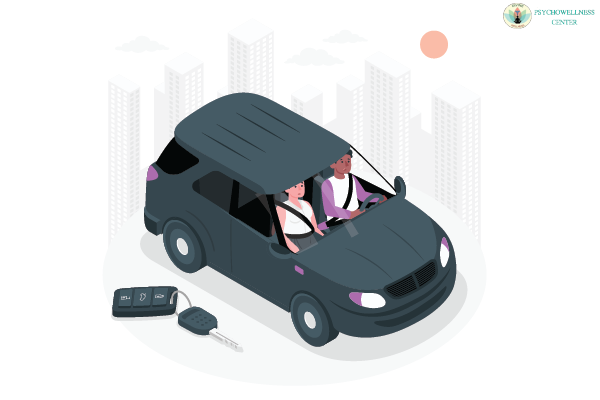Amaxophobia is an irrational fear of driving a vehicle or being in one. Another name for this illness is motorphobia. Driving is a dangerous activity, thus it’s reasonable to feel anxious while doing it. However, if your amaxophobia is strong, you might decide to never ride in a car again. We all experience fears and phobias regularly. There are additional reasons you could experience fear and anxiety when getting into a car besides the obvious connection between driving phobia and auto accidents.
What Is Amaxophobia?
Amaxophobics are fearful of driving a motor vehicle or riding as a passenger in a car or motor vehicle. Amaxophobics may experience such intense Anxiety or panic attacks at the mere thought of getting into a car that they are unable to travel to work, stores, or other locations. Greek for carriage is “amaxa” (or “hamaxa”). A phobia is a fear. Amaxophobia is the fear of operating a vehicle or riding in one. Other names for amaxophobia include:
-
Hamaxophobia.
-
Motorphobia.
-
Ochophobia.
Some people become anxious or afraid while riding in a car, while others are afraid to drive in certain circumstances, such as during the night, at high speeds, when changing lanes, or when merging. Furthermore, compared to fear or worry brought on by general stress or anxiety, this extreme fear is frequently more severe and impairing. If untreated, this fear can interfere with everyday activities and lead to other chronic health issues.
Signs and symptoms of amaxophobia
Regardless matter the source of your fear, phobias produce identical symptoms of anxiety. You may experience these feelings while driving or even just while thinking of driving. Typical signs include:
-
Chest pain
-
Shortness of breath
-
Fast heartbeat
-
Sweating
-
Dizziness
-
Fainting
-
A sense of impending disaster
-
Chills
-
Hot flashes
-
Shaking
-
Nausea
Causes of amaxophobia
As with most phobias, the exact cause of amaxophobia is unknown. However, phobias frequently arise following a stressful event. Your condition could be affected by having been in a car accident or even by hearing about someone else’s accident. Phobias are categorized as anxiety disorders. These conditions may result from an imbalance of brain chemicals known as neurotransmitters. Dopamine and serotonin are two neurotransmitters in particular that might aggravate anxiety symptoms.
Your phobia could also be influenced by the environment in which you were raised. You might have acquired an irrational fear of driving if your parent or legal guardian did. It’s possible to have a phobia of something without going through a painful or unfavorable experience. Some people experience phobias that have no known causes or triggers. To know more consult the Best psychologist in India or search for the Best psychologist delhi.
Diagnosis of amaxophobia
The “Diagnostic and Statistical Manual of Mental Disorders” does not list amaxophobia as a separate disorder (DSM-5). Doctors and other mental health practitioners diagnose mental health issues using the DSM-5 diagnosis handbook. The DSM-5 distinguishes between three different phobias: specific phobia, social phobia, and agoraphobia. Amxophobia fall under the category of specific phobia which is a fear of a specific situation or object.
You can get help figuring out which fear you have, or which phobias you have together. Your symptoms must meet the standard criteria set forth by the American Psychiatric Association, which include the following:
-
Automatic and uncontrollable anxiety symptoms, such as trembling, breathlessness, and stomach discomfort
-
Extreme efforts to stay away from your trigger
-
An aggressive response that is completely in proportion to the risk
-
The anxiety, fear, or avoidance results in clinically substantial suffering or functional impairment.
-
Lasting six months or longer
Types of amaxophobia
Although amaxophobia may present in two different ways, there is no clear method to tell them apart.
Fear of driving: For some people with this illness, their anxiety about getting behind the wheel of a car is their main source of fear.
Fear of being a passenger: Others get symptoms as a result of having a fear of riding in a particular kind of vehicle.
Some sufferers of amaxophobia are nonetheless capable of operating their own vehicles. However, it can be terrifying to consider handing up control of the trip to someone else. Others are triggered by driving itself. Others might also feel amaxophobia in both situations (as driver and passenger).
Treatment of amaxophobia
Medication
Some of the physical and mental symptoms of the disease can be managed by taking medications such as antidepressants and anti-anxiety medications. The combination of these drugs with psychotherapy frequently results in the best results. For that consult the Therapists in delhi or search for the Best psychiatrist near me.
Psychotherapy
Exposure therapy is frequently used as the first-line treatment for specific phobias. People who work with a Counseling psychologist and Online counselor gradually expose themselves to the source of their anxiety while using relaxation techniques. The fear gradually begins to diminish or possibly go away. It is also possible to use Cognitive-behavioral therapy (CBT) to deal with the negative or irrational beliefs that frequently lead to the fear. According to some studies, CBT for certain phobias can sometimes be beneficial after just one to three sessions.
Although amaxophobia can seriously impact your life, there are effective therapies that can help you feel better. You should speak with a mental health professional if you are having symptoms of this disorder that are negatively affecting your life.
Make an appointment for mental health therapy with the Psychowellness Centre. renowned and knowledgeable psychologists. NOIDA, Janakpuri, Dwarka, Faridabad, and Delhi NCR are all close to the facility.
Contribution:

